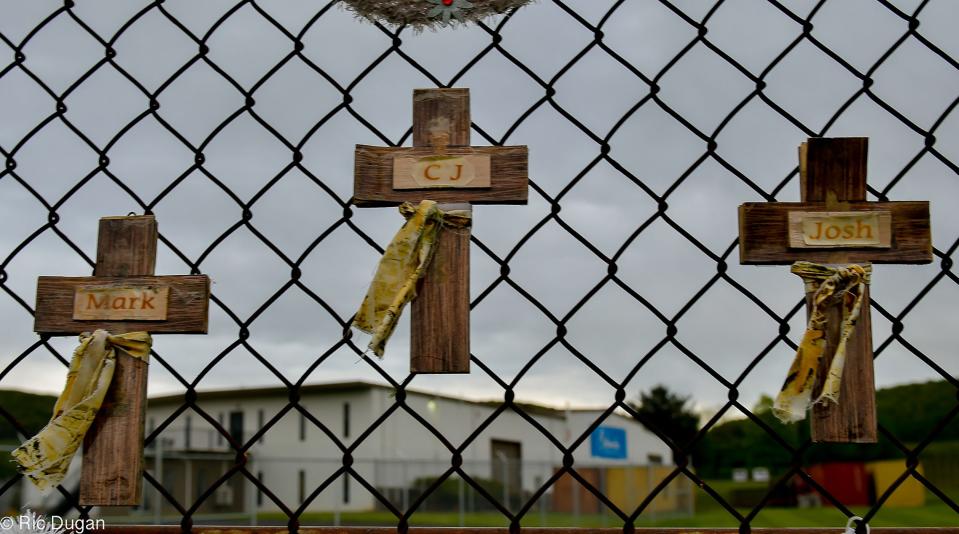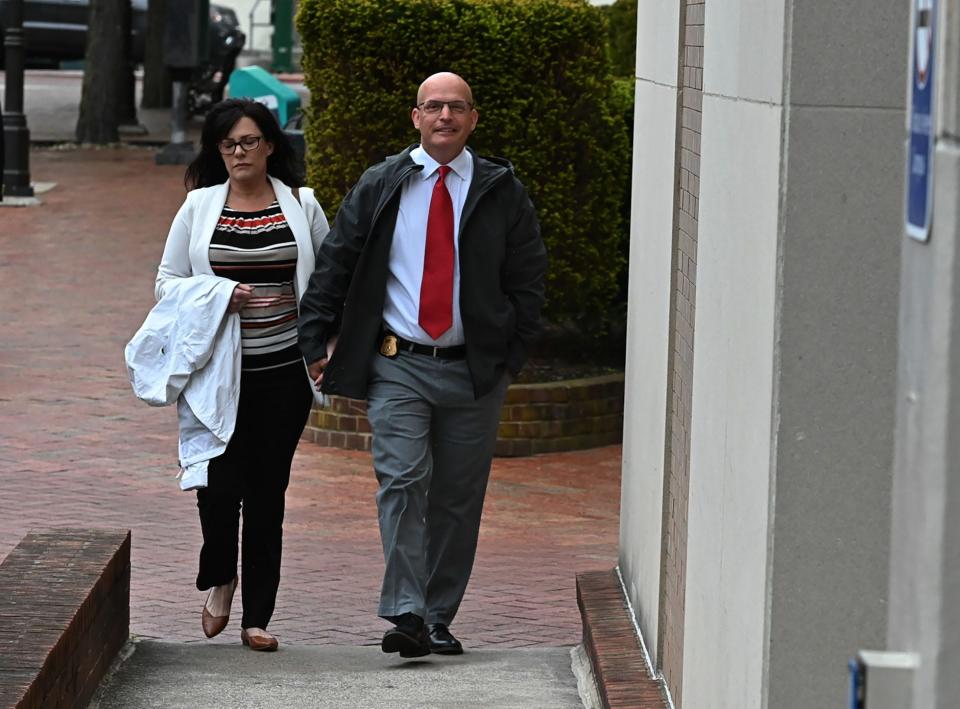Victim confronts Smithsburg mass shooter, calls him a coward
As 14 people took turns addressing a Washington County Circuit Court judge on Tuesday regarding the West Virginia man who shot four co-workers — killing three — last June, the word "coward" came up countless times.
One of them was when the surviving co-worker, Brandon Michael, said, "I would like to say, what a coward to come into a room with unarmed men and just start shooting like that."
Michael said he was shot three times on June 9 by Joe Louis Esquivel, a co-worker at Columbia Machine off Bikle Road near Smithsburg.
His wife, Candice, who is a nurse, said she was grateful to the people that helped her husband before EMS personnel responded.
More on Tuesday's hearing: Insanity plea accepted for mass shooter who killed three near Smithsburg
At the end of the roughly three-hour hearing Tuesday morning, Judge Brett R. Wilson confirmed what the surviving victims and family members said they were told almost a month ago by the prosecuting team. That is that Esquivel, 24, will be sent to a state hospital for treatment for schizophrenia.
Schizophrenia is a major mental disorder in which people may experience a distorted reality and hallucinations.
Before Wilson issued that finding, Michael and family members of the other civilian victims expressed their disappointment in a state judicial system that allows Esquivel to be found not criminally responsible due to mental illness and that he could possibly be released one day if found not a danger to himself or others.
Esquivel is expected to be assigned to the Clifton T. Perkins Hospital Center, a maximum-security forensic psychiatric hospital in Howard County.

Mass shooter pleads guilty to several charges
Court officials explained that state experts from the Maryland Department of Health filed a report finding Esquivel was not criminally responsible for his actions that June day, but that he is competent to stand trial.
Early in the hearing, District Public Defender Angela Oetting confirmed Esquivel was pleading guilty to three counts of first-degree murder, three counts of attempted first-degree murder and one count of first-degree assault with the state stipulating that Esquivel would be found not criminally responsible.
The remaining 27 charges were dismissed.
More about those lost: Remembering community members killed, injured in Columbia Machine shooting near Smithsburg
The murder charges were for the shooting deaths of Mark Alan Frey, 50, of Waynesboro, Pa.; Charles "C.J." Edward Minnick Jr., 31, of Smithsburg; and Joshua "Josh" Robert Wallace, 30, of the Hagerstown area. One of the attempted murder charges was for shooting Michael, then 42, of the Boonsboro area.
The assault charge was for assaulting Columbia Machine worker Hunter Schlotterbeck, at whom Esquivel pointed a gun before fleeing in his car.
The other two attempted murder charges were for shooting at two Maryland State Police officers after fleeing Columbia Machine in his car.
Families told this would happen: If Smithsburg shooting defendant avoids prison, loved ones say it’s ‘a slap in the face’
Oetting said the health evaluation found Esquivel was in a psychotic state related to his schizophrenia, which had not been previously diagnosed.
Assistant State's Attorney Chris McCormack, noting the families' frustration and disappointment, said the state's attorney's office also is disappointed with the report. Prosecutors rely on state doctors and the state health department on a regular basis for their opinion in some cases.
McCormack referred to the state report saying Esquivel, due to schizophrenia, "lacked substantial capacity" regarding the criminality of his conduct and is not criminally responsible for his actions.
Wilson remanded Esquivel to the Washington County Detention Center to be held until the appropriate order is signed for the state Health Department to transport him to a secure facility "for further treatment and confinement and till such time — if ever —" he is found by a preponderance of evidence to not be a danger to himself or others.
New details about shootout with police after Esquivel fled Columbia Machine
Assistant State's Attorney Christine Remsburg said Esquivel was speeding and encountered state police on Md. 66, also known as Mapleville Road, south of Mount Aetna Road.
Remsburg said Lt. Vincent Upole, commander of the Rockville, Md., state police barrack, was returning from delivering paperwork when he heard and responded to the "active shooter" call. He positioned his unmarked Ford Explorer to block Esquivel's car. Witnesses reported Esquivel appeared to speed up when ramming Upole's vehicle, damaging the front end.
Esquivel, from his car, fired shots at Upole, who had exited his SUV, but Remsburg said Upole was able to take cover.
State police Detective Sgt. Phil Martin arrived and exchanged gunfire with Esquivel. Remsburg said Martin shot Esquivel twice, once in the chest and once in the leg.
Esquivel also shot Martin, who recovered and was in court Tuesday along with Upole and other state police officers.

Esquivel's gun appeared to jam and he stopped firing, Remsburg said.
Remsburg said Esquivel told police he was firing at them to get the officers to shoot him. She said the defendant told emergency medical personnel he was shooting at officers not only to shoot the officers, but to get them to shoot him.
Packed courthouse for Maryland mass shooting hearing
Esquivel, with shaggy black hair, wore a blue polo shirt, charcoal pants, dark-rimmed glasses and a blue surgical mask as he was escorted into the downtown Hagerstown courthouse's main and largest courtroom.
More than 50 people sat in the court gallery, most of them surviving victims and family members. Around the perimeter of the courtroom and standing a few yards from Esquivel were 13 judicial security officers from the Washington County Sheriff's Office.
As the judge asked Esquivel questions to ensure he understood the proceedings and was in fact guilty of the crimes he was pleading to, Esquivel's standard answer was, "Ah, yes."
Esquivel affirmed he was on medication, as prescribed, that helped him understand what was going on around him. When asked if he had been in a mental health facility before this case, in the care of a psychologist or psychiatrist, Esquivel said, "Ah, no."
Wilson said he'd received and read several impact statements from victims and/or their families.
More from the hearing: Family members of Columbia Machine shooting victims struggle daily
As 14 people took turns at a microphone, sharing the effects the shooting had on their lives, Esquivel sat next to Oetting at the defense table, facing forward toward a wall.
When he first arrived in the courtroom, Esquivel did not appear to be shaking. As victims and loved ones spoke, he could be seen slightly trembling in his seat.
Statements from public defender, state's attorney
Oetting, in a statement emailed by the public defender's media contact, wrote, "Our criminal law recognizes the impact of psychosis and schizophrenia on criminal responsibility, but it does not minimize the tragedy of this case. The victims, their families, and the community have suffered immeasurably. The magnitude of loss, grief, and pain cannot adequately be expressed.
"Active psychosis is a dramatic, delusional, debilitating state that deprives one of rational thought. Consistent with the law in Maryland and every other state, the State’s Attorney and the Court have acknowledged that the presence of criminal intent, as required by law, is impossible for someone in that condition. We are grateful that Mr. Esquivel will receive the treatment that he needs, in the custody of the Department of Health," Oetting wrote.
Washington County State's Attorney Gina Cirincion was in the court gallery during the hearing. After the hearing, she said, "We share the disappointment that the families are feeling. This was a heartbreaking conclusion to a terrible tragedy, and we appreciate how many people addressed the court on behalf of their loved ones."
Cirincion said Esquivel's mental health will be evaluated annually. If his treatment team feels he's no longer a threat to himself or others, they can recommend to an administrative law judge that he be released. If that judge agrees, the matter would return to local court, before Wilson or his successor, for a final determination.
Oetting, after the hearing, confirmed Esquivel's family was not in the courtroom.
This article originally appeared on The Herald-Mail: Columbia Machine mass shooter pleads guilty; insanity plea accepted

